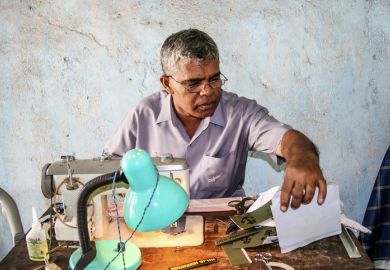Source: Alamy
Pull together: lobbying might be more effective if coordinated sector-wide
Universities, colleges and schools in the UK may take a leaf out of Australia’s book and lobby the government as one body over international education issues.
That was the view of Colin Riordan, chair of the UK Higher Education International Unit, who made the remarks during a debate on whether British institutions that educate international students had failed to present a united front over government-imposed changes to the visa system.
Phil Honeywood, executive director of the International Education Association of Australia, told the International Higher Education Forum, held in London on 17 April, that his country’s sector had previously been “divided and conquered” by the government because of members’ differing priorities.
He explained that universities, colleges and polytechnics had come together after the Canberra government tightened Australia’s visa rules, including closing the student route as a path to settlement, policies that contributed to a significant fall in international numbers in 2010.
In light of the Knight review in 2011, which criticised the reforms, the Education Visa Consultative Committee was set up, involving the government, schools, universities, English language colleges and polytechnics.
Initially there were “territorial issues” along with an “unwillingness to share important information”, Mr Honeywood said.
“However, barriers have been broken down, and full and frank discussions now take place.”
He suggested that joint lobbying had helped to relax the government’s rules and influenced the introduction of post-study work visas for foreign graduates.
However, he added, there was still “confusion” among civil servants and politicians in the UK and Australia over the international education industry.
They “do not understand who we are, [or] what we do”, Mr Honeywood, a former higher education minister for the state of Victoria, told delegates.
The UK’s coalition government closed the post-study work route in April 2012.
Private colleges have been hit harder than universities by other rule changes, as their students have been banned from working while studying. The institutions have also had to sign up to the “educational oversight” inspection process in order to bring in international students.
Mr Honeywood’s comments were echoed during a question-and-answer session by Dominic Scott, chief executive of the UK Council for International Student Affairs, who asked: “Where is our industry body?”
He added: “I wonder if it’s something the International Unit could take on and grow. It’s a whole-of-industry approach. I don’t see that round table in the UK, and we’re losing out because of it.”
In response, Professor Riordan, who is also vice-chancellor of Cardiff University, said that the unit would do “more in that direction”.
“We are cooperating very closely with the Association of Colleges and will work more closely with them,” he said.
A recent report by the unit, Recommendations to Support UK Outward Student Mobility, had received input from all kinds of educational providers, not just universities, he added.
Register to continue
Why register?
- Registration is free and only takes a moment
- Once registered, you can read 3 articles a month
- Sign up for our newsletter
Subscribe
Or subscribe for unlimited access to:
- Unlimited access to news, views, insights & reviews
- Digital editions
- Digital access to THE’s university and college rankings analysis
Already registered or a current subscriber? Login




